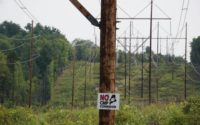Maine’s Supreme Judicial Court has upheld the validity of state land leases granted for the corridor of a $1-billion, 145-mile transmission line underway by utility Central Maine Power to connect Canadian hydropower to Massachusetts’ power grid.
The Nov. 29 ruling rejected the claim in a lawsuit by opponents to the project, New England Clean Energy Connect, that a 2021 state referendum that halted construction also nullified the leases. The court ruled that the referendum vote could not retroactively nullify leases granted by the Maine Bureau of Park and Lands for two tracts of public reserved lands on 1,241 acres in Maine's Upper Kennebec Region.
The Maine high court had also ruled In August that the referendum could be unconstitutional, finding that the project's cancellation could violate Central Maine Power's rights. It left the final decision on that issue to a lower state court. Project work remains on hold pending the outcome of that court’s review of whether the utility can prove it has “vested rights” to complete construction based on how much of the project it has finished so far.
That decision is expected after a trial set for April.
The lease decision "is yet another step in the right direction for Maine’s renewable energy future,” says Scott Mahoney, general counsel for the parent of Central Maine Power. "For the past three years, despite funding by fossil fuel opponents, every regulatory body at the local, state, and federal level has thoroughly reviewed NECEC and all agree it is beneficial for Mainers. We look forward to determining our next steps for this critical project.”
Sandi Howard, director of the nonprofit opponent group that opposes the project says, “we were very disappointed. The Maine Constitution clearly places a safeguard of a two thirds legislative approval to protect Maine's public lands from for-profit development like the CMP corridor."






Post a comment to this article
Report Abusive Comment